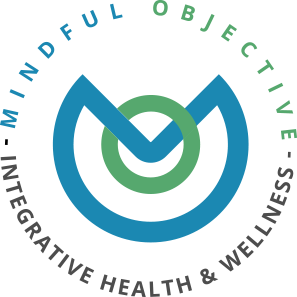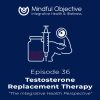
- 0 Comments
- Mindful Objective
Managing Migraines Naturally
Exploring Holistic Approaches
Migraines are more than just headaches. They are complex neurological events that can cause significant disruption to a person’s daily life. Sufferers often experience a range of symptoms, including throbbing pain, nausea, and sensitivity to light and sound. While many turn to medication for relief, a holistic approach focusing on identifying triggers, nutritional deficiencies, and the use of supplements can offer an effective alternative or complement to traditional treatments.
In Episode 1 of our Mindful Objective podcast, “Migraines Unmasked,” we dive deep into different common causes. If you have struggled with migraines, this episode is for you!
Available on Apple, Amazon Music, iHeartRadio, Spotify, YouTube, and other platforms.
Understanding Migraine Triggers
The first step in a holistic approach to managing migraines is identifying and understanding the individual triggers. Migraines can be triggered by a wide variety of factors including stress, hormonal changes, environmental stimuli like bright lights or loud noises, and even certain foods. Keeping a detailed diary that tracks your daily activities, diet, and the onset of migraines can help pinpoint specific triggers. Once identified, you can begin to make lifestyle changes to avoid these triggers.
Nutritional Deficiencies and Migraines
Research has shown that certain nutritional deficiencies can increase the frequency and intensity of migraine attacks. Common deficiencies seen in migraine sufferers include magnesium, riboflavin (vitamin B2), and Coenzyme Q10. This is where functional medicine lab testing comes into play to identify nutritional deficiencies, food sensitivities, and hormonal issues.
-
- Magnesium: Often referred to as the “relaxation mineral,” magnesium can help prevent the wave of brain signaling, known as cortical spreading depression, which produces visual and sensory changes during a migraine. It’s also essential for the proper function of nerves and muscles. Incorporating magnesium-rich foods like leafy greens, nuts, and whole grains or taking supplements can help mitigate migraine frequency.
-
- Riboflavins: This B vitamin plays a crucial role in energy production and is thought to help decrease migraine frequency by improving mitochondrial energy metabolism. Foods rich in riboflavin include eggs, lean meats, and fortified cereals. Riboflavin supplements may be beneficial for those unable to meet their needs through diet alone.
-
- Coenzyme Q10: CoQ10 is an antioxidant that helps produce energy in cells. Studies have shown that CoQ10 supplements can reduce both the frequency and duration of migraines.
References: (BMJ Open) (NMI Health) (Q10facts) (Mayo Clinic).
It’s important to note that before starting any supplement, you should consult your healthcare provider.
How Supplements Can Help
Beyond addressing deficiencies, other supplements have been found to help manage migraine symptoms. For example, Omega-3 fatty acids, known for their anti-inflammatory properties, can reduce the frequency of headaches. Feverfew, a herbal supplement, has been used for centuries to treat migraines. It is believed to work by reducing inflammation, which can lead to a decrease in migraine frequency.
Herbal supplements like Butterbur are also popular among migraine sufferers. However, it’s crucial to choose PA-free Butterbur supplements to avoid liver toxicity. The efficacy of these supplements can vary, and their use should be a decision made with the guidance of a healthcare provider.
The Role of Health Practitioners
Our health practitioners play a pivotal role in the holistic management of migraines. They can help identify potential dietary triggers and nutritional deficiencies, recommend appropriate supplements, and monitor their effectiveness. Furthermore, our practitioners can offer guidance on lifestyle modifications and alternative methods such as acupuncture or yoga, which can help reduce stress and potentially decrease the frequency of migraine attacks.
Conclusion
About Mindful Objective
At Mindful Objective, we’re here to help you take charge of your health with a practical, personalized, and integrative approach. Whether you’re navigating chronic symptoms, building healthier habits, or preparing for the unexpected, we offer the support and tools you need to stay informed and empowered.
Our offerings include:
-
Podcasts, where we break down real health topics in clear, relatable language
-
1:1 health coaching to guide you through sustainable lifestyle changes tailored to your goals
-
Access to functional lab testing that helps uncover the root causes of health imbalances
-
Educational resources and workshops that make wellness simple and actionable
-
A holistic focus that blends natural health strategies with evidence-based insights
We’re here to help you connect the dots, understand what your body needs, and create a realistic plan for long-term wellness. At Mindful Objective, your health isn’t just a goal—it’s a foundation for everything else.
Want to learn more or get started? Check Us Out!
This is for informational and educational purposes only. We do not diagnose, cure, or treat any illness or disease.






